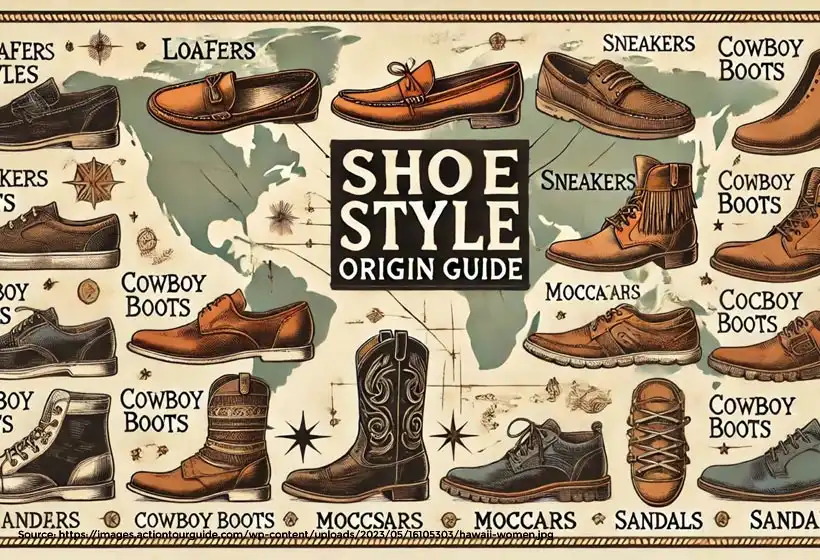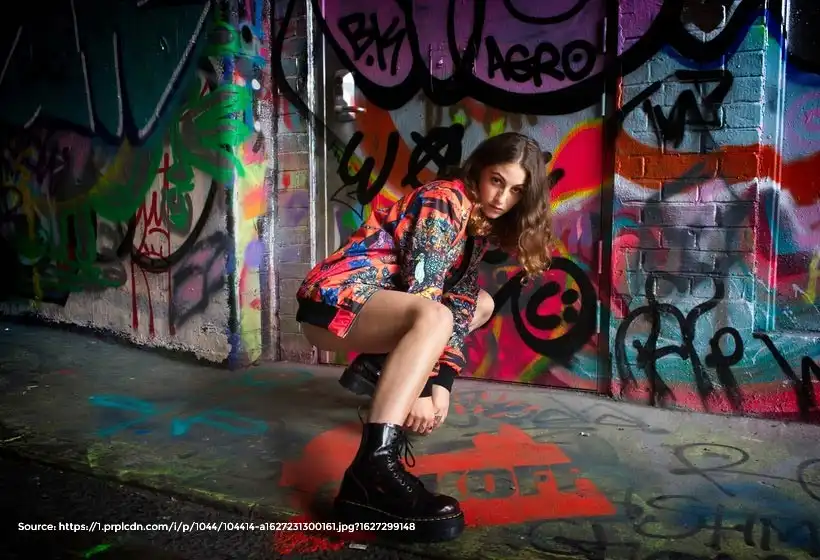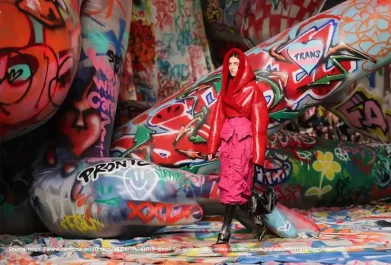powershopr.com provides objective and unbiased recommendations to help you find the best coupon for you. When you use our links to shop for products, we may earn a commission at no cost to you and in no way affects our editorial independence.
Ever stopped to think about how your favorite pair of shoes came to be? From rugged cowboy boots to breezy sandals, every shoe style has a rich history woven into its design. The evolution of footwear tells stories of culture, necessity, and craftsmanship. Today, PowerShopr will take you on a global tour, exploring iconic shoe styles and their origins, with a special focus on four US-origin shoe styles that have left an indelible mark on fashion and function.
Let’s dive into some of the most remarkable shoe styles from around the world and their fascinating origins.
Step Back in Time: When Were the First Shoes Made?
1. Fort Rock Sandal – The World’s Oldest Shoe in History
Origin: USA (Oregon) | Era: 7000-8000 B.C.
Let’s start with the oldest known shoe in the world—the Fort Rock Sandal. Discovered in 1938 by archaeologist Luther Cressman in a cave in Oregon, these woven sagebrush bark sandals date back over 9,000 years. Preserved beneath layers of volcanic ash from Mount Mazama, they are a testament to the ingenuity of ancient Native American tribes who crafted them for durability and protection.
Speciality & Features:
- Material: Woven sagebrush bark
- Design: Complex weaving for flexibility and breathability
- Function: Protection against rough terrain
- Historical Significance: Oldest shoe ever discovered, offering insight into early footwear innovation
Even though these sandals are ancient, their woven design is similar to modern espadrilles and eco-friendly footwear, proving that style and function transcend time.
2. Cowboy Boots – The Quintessential American Icon
Origin: USA | Era: 19th Century
Few shoes embody American heritage like the Cowboy Boot. Originally designed for cowboys herding cattle across the rugged plains, these boots provided durability, protection, and support in the saddle. Inspired by Spanish vaquero boots and modified for the needs of the American West, cowboy boots became a symbol of freedom, resilience, and adventure.
Speciality & Features:
- Material: Leather, sometimes adorned with intricate embroidery
- Design: High shaft for leg protection, pointed toe for stirrup ease, angled heel for stability
- Function: Designed for horseback riding, but later adopted as a fashion statement
- Cultural Significance: Associated with country music, rodeo culture, and Western heritage
Modern cowboy boots have evolved beyond the ranch, making their way into high fashion and street style while still honoring their rugged roots.
3. Moccasins – A Timeless Native American Tradition
Origin: USA (Indigenous Tribes) | Era: Pre-Colonial America
Soft, flexible, and deeply tied to Native American traditions, Moccasins are one of the most enduring shoe styles in history. Originally handcrafted by Indigenous tribes across North America, these leather shoes were designed for comfort, stealth, and durability in both woodland and plains environments.
Speciality & Features:
- Material: Soft leather, often deerskin or moosehide
- Design: Seamless construction for comfort, sometimes adorned with beadwork and fringe
- Function: Silent movement for hunting, everyday wear
- Cultural Significance: A deeply symbolic shoe representing Indigenous heritage and craftsmanship
Today, moccasins are a staple in casual footwear, blending tradition with contemporary fashion. Whether lined with fur for winter warmth or designed as slip-ons for daily wear, they remain as stylish as they are comfortable.
4. Boat Shoes – Preppy Nautical Footwear for the Stylish Explorer
Origin: USA | Era: 1935
Invented by Paul A. Sperry in 1935, Boat Shoes revolutionized maritime footwear. Inspired by the way his dog’s paws gripped wet surfaces, Sperry designed a shoe with a slip-resistant rubber sole perfect for sailors navigating slippery decks. Soon, boat shoes became a staple beyond the docks, embraced for their smart-casual appeal.
Speciality & Features:
- Material: Leather or canvas upper with a non-slip rubber sole
- Design: Hand-sewn construction with water-resistant treatment
- Function: Prevents slipping on wet surfaces, breathable and comfortable for warm weather
- Cultural Significance: Synonymous with preppy fashion and coastal lifestyles
Today, boat shoes are a go-to choice for summer wear, pairing effortlessly with chinos, shorts, and even semi-formal outfits. They embody the laid-back elegance of seaside living while staying true to their practical origins.
4 Shoe Style that Resemble the Ancient US origin
The evolution of footwear in the U.S. is deeply rooted in history, with several modern styles drawing inspiration from ancient traditions. Here are four shoe styles that reflect the heritage of early American craftsmanship and culture.
Product 1: STUART WEITZMAN WOMENS FELICITY BOW SANDALS
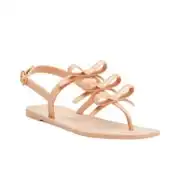
Stuart Weitzman Womens Felicity Bow Sandals
Store: Bloomingdales
Price: $195.00
Use Discount Coupons for Great Deals

- Use Discount Coupons for Great Deals
Stuart Weitzman Womens Felicity Bow Sandals
- Use Discount Coupons for Great Deals
Features:
- True-to-size fit
- Open toe with elegant bow detailing
- Buckled slingback strap for a secure fit
- 0.39″ heel for subtle elevation
- Crafted with high-quality rubber upper, lining, and sole
Product Description:
Inspired by the minimalist yet practical design of ancient footwear, the Stuart Weitzman Felicity Bow Sandals blend historical elegance with modern style. These sleek sandals feature a delicate bow detail at the toe, adding a chic touch to any outfit. Perfect for warm weather, their cushioned footbed ensures comfort with every step.
How to Style:
- Pair with flowy summer dresses for an effortlessly classy look.
- Match with linen pants and a breezy blouse for a relaxed vacation vibe.
- Wear with tailored shorts and a tank top for casual, everyday elegance
Product 2: JUSTIN BOOTS WOMENS GYPSY NETTIE WESTERN BOOTS
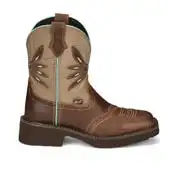
Justin Boots Womens Gypsy Nettie Western Boots
Store: Academy Sports
Price: $114.99
Use Discount Coupons for Great Deals

- Use Discount Coupons for Great Deals
Justin Boots Womens Gypsy Nettie Western Boots
- Use Discount Coupons for Great Deals
Features:
- Durable, slightly distressed cowhide leather
- J-Flex Flexible Comfort System® for superior support
- Classic square toe design
- Block heels for added stability
- Stylish piping details
Product Description:
Justin Boots’ Gypsy Nettie Western Boots bring the heritage of cowboy culture into modern-day fashion. These boots combine rustic charm with contemporary comfort, making them a must-have for any fashion-forward cowgirl.
How to Style:
- Pair with denim jeans and a plaid shirt for an authentic cowboy aesthetic.
- Wear with a flowy bohemian dress for a trendy festival-ready look.
- Match with leather pants and a fitted jacket for an edgy, fashion-forward vibe.
Product 3: MINNETONKA MEN’S DOUBLE BOTTOM SOFTSOLE MOCCASINS
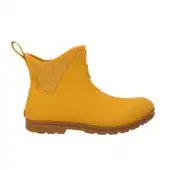
Minnetonka Men’s Double Bottom Softsole Moccasins
Store: Academy Sports
Price: $109.99
Use Discount Coupons for Great Deals

- Use Discount Coupons for Great Deals
Minnetonka Men’s Double Bottom Softsole Moccasins
- Use Discount Coupons for Great Deals
Features:
- Genuine suede leather upper
- Padded insole for extra comfort
- Traditional whipstitch detailing
- Lightweight rubber sole for indoor/outdoor wear
Product Description:
Blending tradition with modern comfort, the Minnetonka Double Bottom Moccasins are perfect for indoor and outdoor wear. The classic slip-on design and cushioned insole provide a relaxed fit while staying true to their Native American roots.
How to Style:
- Pair with chinos and a casual tee for a laid-back weekend look.
- Wear with loungewear for ultimate at-home comfort.
- Match with a denim jacket and fitted jeans for a timeless Americana feel.
Product 4: SPERRY TOP-SIDER MEN’S AUTHENTIC ORIGINAL BOAT SHOES
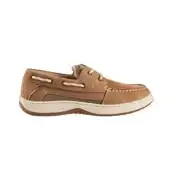
Sperry Top-Sider Men's Authentic Original Boat Shoes
Store: Academy Sports
Price: $39.97
Use Discount Coupons for Great Deals

- Use Discount Coupons for Great Deals
Sperry Top-Sider Men's Authentic Original Boat Shoes
- Use Discount Coupons for Great Deals
Features:
- Premium full-grain leather upper
- Hand-sewn moccasin construction
- Non-marking rubber outsole with Wave-Siping™ for traction
- 360° lacing system for a customized fit
Product Description:
Sperry’s Authentic Original Boat Shoes are a blend of function and fashion. Whether you’re on a boat or on land, these shoes provide unparalleled grip and style, making them a versatile addition to any wardrobe.
How to Style:
- Wear with khakis and a polo shirt for a polished, preppy look.
- Pair with tailored shorts and a linen button-down for a breezy summer ensemble.
- Match with cuffed denim and a light sweater for a sophisticated, casual outfit.
40 Shoe Styles and Their Fascinating Origins
Shoes are more than mere accessories; they are cultural artifacts that tell the stories of civilizations across time and geography. Each style reflects the unique needs, climates, and traditions of its place of origin. Here are 40 distinctive shoe styles from around the world and their fascinating origins.
- Gomusin (South Korea): Traditional rubber shoes worn with hanbok, Korea’s national dress.
- Espadrille (Spain): Casual sandals with jute soles and fabric uppers, originating from the Pyrenees.
- Brothel Creeper (United Kingdom): Thick-soled shoes popularized by British soldiers post-World War II.
- Winklepicker (United Kingdom): Pointed-toe shoes inspired by medieval footwear, popular in the 1950s.
- Turnshoe (Europe): Medieval footwear made by sewing inside out and then turning right side out.
- Okobo (Japan): Wooden sandals worn by apprentice geishas, often with a hollow sound chamber.
- Sabot (France): Wooden clogs worn by peasants, believed to be the origin of the word “sabotage.”
- Lotus Shoe (China): Tiny shoes for bound feet, symbolizing beauty in ancient China.
- Crakow (Poland): Medieval shoes with long pointed toes, named after the city of Kraków.
- Geta (Japan): Elevated wooden sandals preventing kimono from touching the ground.
- Paduka (India): Toe-knob sandals, often wooden, worn by ascetics and saints.
- Plaited Bark Shoe (Finland): Shoes made from woven tree bark, used by Finnish peasants.
- Bast Shoe (Russia): Woven from linden bark, traditional footwear for Russian peasants.
- Opanak (Serbia): Leather shoes with curled tips, part of Serbian national costume.
- Tsarouhi (Greece): Leather shoes with pom-poms, worn by Greek soldiers.
- Kolhapuri Chappal (India): Handcrafted leather sandals from Maharashtra, known for durability.
- Esparto Sandal (Spain): Sandals made from esparto grass, traditional in Spanish regions.
- Brogue (Scotland/Ireland): Leather shoes with decorative perforations, originally for draining water.
- Clog (Netherlands): Wooden shoes protecting feet from wet Dutch fields.
- Mojari (India): Embroidered leather shoes from Rajasthan, worn by royalty.
- Ballet Flat (France): Inspired by ballet slippers, popularized in the 20th century.
- Mukluk (Arctic Regions): Warm boots made from reindeer or seal skin by indigenous Arctic people.
- Huarache (Mexico): Woven leather sandals, traditional Mexican footwear.
- Jutti (India/Pakistan): Embellished slip-on shoes, part of traditional attire.
- Babouche (Morocco): Soft leather slippers with pointed toes, common in Moroccan culture.
- Alpargata (Argentina): Canvas shoes with rope soles, favored by Argentine farmers.
- Galesh (Iran): Handmade canvas and rubber shoes, traditional in northern Iran.
- Pampootie (Ireland): Rawhide shoes worn by Aran Islanders, resembling moccasins.
- Valenki (Russia): Felt boots for harsh Russian winters.
- Tsonga Sandal (South Africa): Handcrafted leather sandals by the Tsonga people.
- Zori (Japan): Straw sandals, predecessors to modern flip-flops.
- Galesh (Iran): Traditional footwear made from woven fabric, worn in rural areas.
- Abarka (Spain): Leather sandals from the Basque region, used by shepherds.
- Peshawari Chappal (Pakistan): Sturdy sandals from Peshawar, known for their cross-strap design.
- Kabkab (Lebanon): Wooden platform sandals, historically worn by women to protect feet from dirty streets.
- Charentaise (France): Soft woolen slippers from the Charente region.
- Galesh (Iran): Traditional footwear made from woven fabric, worn in rural areas.
- Espadrille (France): Light canvas shoes with esparto rope soles, popular in French fashion.
- Bast Shoe (Scandinavia): Footwear made from bast fibers, used in Scandinavian countries.
- Opinga (Balkans): Traditional leather shoes with upturned toes, worn in Balkan regions.
Each of these shoe styles offers a glimpse into the culture and history of its region, showcasing the diversity and creativity of footwear design across the globe.
Step Up Your Style with PowerShop!
From ancient traditions to modern fashion statements, every shoe tells a story. Whether you’re drawn to the historical significance of Fort Rock Sandals, the rugged charm of cowboy boots, the timeless appeal of moccasins, or the nautical elegance of boat shoes, these styles are more than just footwear—they’re a testament to craftsmanship and culture.
Ready to make these iconic shoe styles your own? Step up your shoe game today! Find your perfect pair at PowerShopr.com and walk through history in style.
Your perfect shoes are just a click away!
TRENDING
THE LATEST
READ MORE
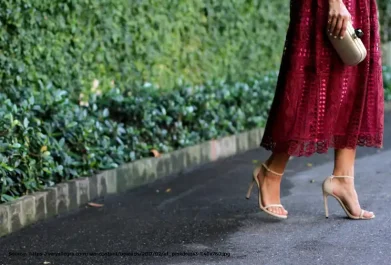
Matching Shoes for Valentine’s Day Dress Styles for the Perfect Date Night Romance!
After the busy holiday season, January often feels quiet and a little gloomy.... Read More
Lakers vs. Rockets – Watch NBA Match Live with Puma Shoes
The excitement is at its peak as the Los Angeles Lakers prepare to... Read More





